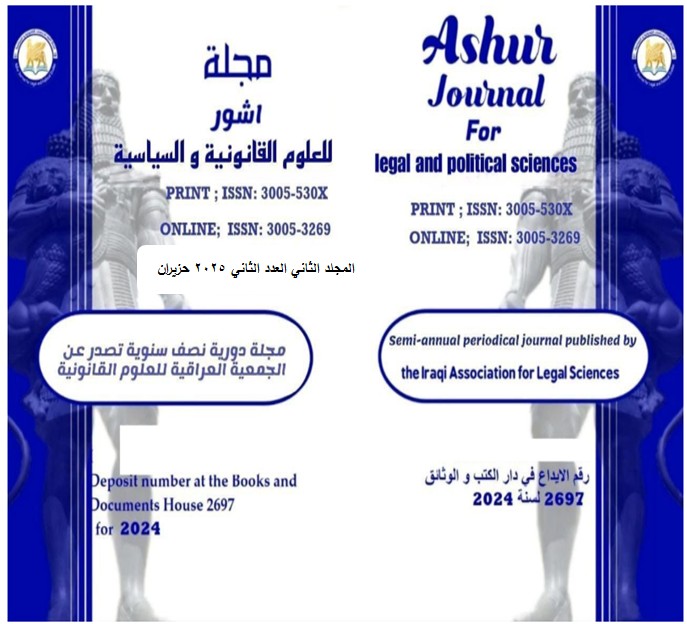Repercussions of the Yemeni crisis in the regional and international Environments Between (2011 -2019)
DOI:
https://doi.org/10.64184/ajlps.V2.I2.Y2025.P434-465.56Keywords:
Yemeni crisis, Saudi Arabia, Iran, United States of America, Russia.Abstract
The Yemeni crisis is like the crises experienced by some Arab countries (Syria - Libya) as a result of the outcomes of the events of the Arab Spring. With the outbreak of war in Yemen, the human tragedy began, the shattering of the structure of society, and the massive scale of devastation in the cities of the conflict. These are the most prominent headlines that follow the danger of growing regional and international competition and interference. Foreign affairs, which led to the complexity of the war and the absence of any near-term horizon for the end of the “disastrous” war, whether by peace or by war. It is not possible to rely much on bringing peace to Yemen through negotiations as long as there are regional interventions and political and military support for both sides of the war while acknowledging the impossibility of a military solution for either of them, in the absence of any prospects for a political settlement that satisfies the parties to the war or any “pressing” international interest to force those parties to stop. Opening fire by resolutions adopted by the UN Security Council.
References
First: Books
1. Adel Mujahid Al-Sharbaji, Political Developments in Arab Countries Since 2011, Beirut, Sharq Al-Kitab, 2016.
2. Haitham Ali Abdullah, The Problem of Political Instability in Yemen After 2011, Baghdad, Dar Muharroo Al-Kutub, 1st ed., 2019.
Second: Periodicals
1. Ahmed Diab, Dimensions of International Positions on the Arab Coalition in Yemen, Cairo, Arab Affairs Magazine, Issue (162), 2015.
2. Ahmed Ardoum, The Saudi-Iranian Conflict and Its Impact on Yemen, Journal of Political Science and Law, Issue (2), Arab Democratic Center, 2017.
3. Bashir Abdel Fattah, Transformations in the Turkish and Iranian Positions Towards Operation Decisive Storm, Cairo, Arab Affairs Magazine, Issue (162).
4. Saeed Refaat, Regional and International Developments and Their Implications for the Dynamics of the Arab Situation, Cairo, Arab Affairs Magazine, Issue (162), 2015.
5. Salah Samir Al-Bandarawi, Operation Decisive Storm and the Future of the Arab Regional System, Political Trends Magazine, Issue (6), Arab Democratic Center, 2018.
6. A Group of Researchers, Where Is the Yemeni Crisis Headed?, Amman, Center for Middle East Studies, Issue (7), 2015.
7. Mustafa Abdel Aziz Morsi, Operation Decisive Storm - Its Necessities, Objectives, Prospects, and Implications, Cairo, Arab Affairs Magazine, Issue (162), 2015.
8. Mona Bou Maaza, Military Intervention of the Arab Coalition Countries in Yemen, Algeria, Journal of Political and Legal Notebooks, Issue (19), Faculty of Law and Political Science, Badji Mokhtar University, 2018.
9. Nadia Fadel Abbas Fadli, The Arab Spring in Yemen: Causes Results, Iraq, Kufa Journal of Legal and Political Sciences, Issue (17), Volume 1, 2013
Third: Reports
1. Raymond Lee, China and the War in Yemen - Non-Alignment and a Peaceful Solution, Doha, Al Jazeera Center for Studies Report Series, 2015.
2. Ali Al-Dahab, The Motives and Risks of the Emirati Role in the Yemeni War, Doha, Al Jazeera Center for Studies Report Series, 2017.
3. Amr Sobhi, Report - The Repercussions of the Yemeni Crisis on the Gulf Cooperation Council Countries since 2011, Cairo, Arab Democratic Center, 2018.
4. Mahmoud Al-Taher, Yemen: Russia's Winning Card to Squeeze Victory in Syria and Ukraine, Doha, Al Jazeera Center for Studies Report Series, 2016.
Fourth: Research and Studies
1. Situation Assessment: The Stagnation of the Conflict in Yemen and the Possibility of Russian Intervention, Strategic Thought Center for Studies.
2. Situation Assessment: The Future of Emirati Influence in Yemen, Strategic Thought Center for Studies.
3. Saeed Al-Hajj, The Limits of Change in Saudi Foreign Policy, Egyptian Institute for Political and Strategic Studies, 2016.
4. Majed Al-Madhaji, How the Transitional Phase in Yemen After 2011 Ended in War, Yemen, Sana'a Center for Strategic Studies, 2016.
5. Mohammed Hassan Al-Qadi, The Iranian Role in Yemen and Its Implications for Regional Security, International Institute for Iranian Studies, 2017.
6. Mohamed Ezzat Rahim, Preemptive Deterrence - What Has Changed in Saudi Foreign Policy Orientations and Tools? Cairo, Regional Center for Strategic Studies, 2015.
7. Nasser Al-Rubaie, Saudi Arabia's Objectives in Yemen, Selected Articles, Carnegie Endowment for International Peace, 2016.
8. Hisham Al-Qarawi, Yemen's Revolution: Ali Abdullah Saleh or Institutional Replacement? Doha, Arab Center for Research and Policy Studies, 2011.
Fifth: The Internet
1. Ibrahim Manshawi, "The Rising Controversy over the Future of Operation Decisive Storm in Light of Regional Developments," Arab Center for Studies and Research, 2016, Internet http://www.acrseg.org
2. Internet https://www.i24news.tv//ard9
3. Khalifa Khalifi, "An Analytical Look at the Foreign Policy of the Kingdom of Saudi Arabia under King Salman," Internet www.alathir.net/serch2016
4. Mohammed Samir al-Rantisi, "The Turkish Position on Operation Decisive Storm: Reasons and Developments," 2015, Al Jazeera website http://www.aljazera.net
5. Mohammed Fawzi, "The Arab NATO: Between American Ambition and Arab Reality," Arab Democratic Center, 2018, Internet http://democratiaca.de
Downloads
Published
Issue
Section
License
The authors retain Full copyright of their published article
Ashur Journal of Legal and Political Sciences applies the Creative Commons Attribution 4.0 International (CC BY 4.0) License to articles and other works we publish. If you submit your paper for publication by AJLPS, you agree to have the CC BY 4.0 license applied to your work.
Articles can be read and shared for under the following conditions:
BY: Attribution must be given to the original source (Attribution)
Full details available at
https://creativecommons.org/licenses/by/4.0/






